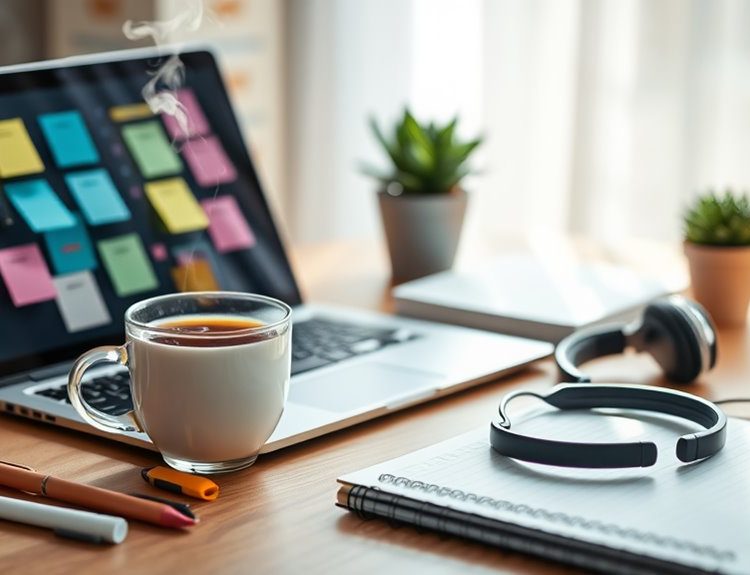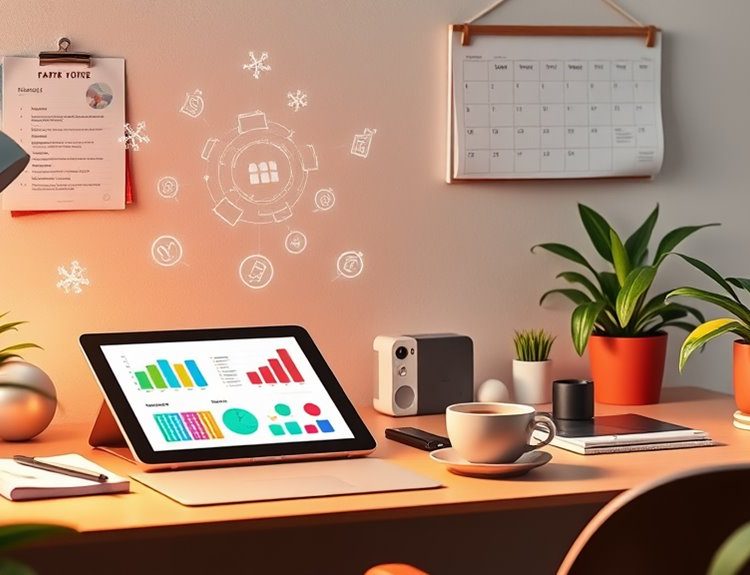Study Routines That Help You Learn Faster!
To learn faster, establish a consistent study schedule that aligns with your goals. Active learning techniques, like using flashcards and quizzes, enhance retention through memory retrieval. Don’t forget to incorporate breaks; they refresh your focus and processing. Create an ideal study environment by minimizing distractions and personalizing your space for motivation. Finally, leverage technology—apps for flashcards and productivity can boost efficiency. Together, these strategies can greatly improve your learning speed and understanding. If you want to explore more effective methods, there are even deeper insights available to enhance your study routines.
Key Takeaways
- Establish a consistent study schedule with specific goals to improve time management and enhance focus during study sessions.
- Utilize active learning techniques, like flashcards and quizzes, to engage memory retrieval and reinforce long-term retention.
- Incorporate regular breaks, such as mindful meditation or physical activity, to enhance focus and improve cognitive processing.
- Create an optimal study environment by minimizing distractions, ensuring good lighting, and personalizing the space to boost motivation.
- Leverage technology and tools, like spaced repetition apps and productivity software, to organize tasks and reinforce learning efficiently.
Establishing a Consistent Schedule
Establishing a consistent schedule is essential for optimizing your learning process. A well-structured routine not only enhances your time management skills but also aligns with effective goal setting. By dedicating specific time slots for studying, you create a predictable environment that promotes focus and retention.
Research shows that consistency in study habits can lead to improved academic performance, as it allows your brain to adapt and anticipate learning sessions.
To implement this effectively, start by evaluating your current commitments and identifying the best times for study. Block out these periods in your calendar, treating them as non-negotiable appointments.
Next, set specific, measurable goals for each session. Instead of vague objectives like “study math,” aim for “complete five algebra problems” or “review chapter two.” This precision not only helps maintain motivation but also provides a clear benchmark for success.
Utilizing Active Learning Techniques
A consistent study schedule sets the stage for integrating active learning techniques, which can greatly enhance your understanding and retention of material. One of the most effective methods is active recall, where you actively retrieve information from memory rather than passively reviewing notes. Research shows that this process strengthens neural connections, promoting long-term retention.
To implement active recall, you can use flashcards or self-quizzing techniques. This approach not only assesses what you know but also identifies areas needing further study.
Pairing active recall with spaced repetition—reviewing material at increasing intervals—can further optimize your learning. Studies indicate that spaced repetition reduces forgetting, allowing you to reinforce knowledge over time.
By strategically scheduling your study sessions, you can incorporate these techniques effectively. For instance, after learning a new concept, revisit it after one day, then three days, and later a week. This method helps combat the forgetting curve and enhances mastery.
Incorporating active learning techniques like active recall and spaced repetition into your routine not only deepens your understanding but also prepares you for higher levels of cognitive engagement, ultimately leading to superior academic performance.
Incorporating Breaks and Downtime
Incorporating breaks and downtime into your study routine is essential for maximizing productivity and retention. Research shows that taking intentional breaks can enhance focus and improve information processing. Mindful meditation and physical activity are particularly effective during these breaks. Mindful meditation helps you reset your mind, while physical activity boosts blood flow and cognitive function.
Here’s a simple framework to structure your breaks effectively:
| Type of Break | Duration | Purpose |
|---|---|---|
| Mindful Meditation | 5-10 mins | Reset focus and reduce stress |
| Physical Activity | 10-15 mins | Increase energy and stimulate brain |
| Reflection | 5 mins | Consolidate learning and insights |
Creating an Optimal Study Environment
After you’ve taken your breaks and allowed your mind to recharge, the environment in which you study can greatly influence your ability to learn effectively. Your study space should be tailored to minimize distractions and enhance focus. Research shows that environmental factors like lighting, noise levels, and even color can considerably affect cognitive performance.
To create an ideal study environment, choose a space that’s well-lit, ideally with natural light, as it boosts mood and attention. Keep your study area organized and free from clutter; a tidy space can lead to a more focused mind.
Also, consider the ambient noise. While some may thrive in silence, others might benefit from soft background music or white noise to mask distractions. Experiment with these elements to see what works best for you.
Additionally, personalize your study space with motivational elements, such as quotes or images that inspire you. This can enhance your emotional connection to the material.
Ultimately, by intentionally designing your study environment, you’re setting yourself up for greater success in mastering complex concepts and retaining information.
Leveraging Technology and Tools
Harnessing technology in your study routine can greatly enhance your learning efficiency. By integrating digital resources and productivity apps, you can create a more dynamic and engaging study environment. Research shows that using tools like flashcard apps, note-taking software, and online quizzes can boost retention rates considerably. For instance, spaced repetition algorithms found in apps like Anki help reinforce memory by revisiting concepts at ideal intervals, making your study sessions more effective.
Moreover, productivity apps such as Todoist or Trello allow you to organize tasks and set deadlines, which can foster accountability and structure. You can prioritize your study goals, ensuring you focus on high-impact areas. These tools also minimize distractions; features like website blockers can help maintain concentration during critical learning periods.
In addition, consider exploring online platforms that offer video lectures and interactive exercises, which cater to various learning styles. This multifaceted approach not only diversifies your study methods but also increases engagement, ultimately leading to deeper understanding.
Frequently Asked Questions
How Can I Stay Motivated During Long Study Sessions?
To stay motivated during long study sessions, set specific goals and take regular study breaks. Research shows that structured breaks enhance focus and retention, helping you maintain energy and motivation throughout your learning process.
What Should I Do if I Can’t Concentrate While Studying?
If you can’t concentrate while studying, try distraction techniques like the Pomodoro method. Incorporate concentration exercises such as mindfulness meditation. These strategies enhance focus and can greatly improve your overall study effectiveness and retention.
Is It Beneficial to Study With Friends or Peers?
Studying with friends is like sharpening iron; collaborative learning enhances understanding. Engaging in discussions and receiving peer feedback can reveal insights you might miss alone, ultimately deepening mastery and retention of complex concepts.
How Do I Effectively Review Material Before an Exam?
To effectively review material before an exam, utilize active recall by testing yourself on key concepts. Combine this with spaced repetition, revisiting information at increasing intervals, to strengthen retention and enhance overall understanding.
Can I Study Effectively in Noisy Environments?
Imagine trying to concentrate amid chaos. You can study effectively in noisy environments by employing noise management strategies and focus techniques, like using noise-canceling headphones or setting specific goals to maintain your concentration and productivity.



